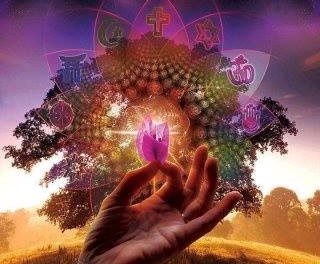A Healthy Religion Is Not About Religious Beliefs

A neighbor asked me recently whether I go to church on Sundays. I guess he simply assumed I was a Christian.
Because conservative theology has become the primary voice speaking for Christianity these days, I am always a bit uncomfortable admitting that I’m Christian, and that I do go to church most Sundays. I rarely add that I’m also an ordained pastor in the Christian church.
I told him “Yes. I attend a healthy, progressive Christian church most Sundays”.
Of course, his follow up question was “what do you mean it’s a healthy church”? I swallowed the need welling up in me to become defensive, took a deep breath, and offered him a short answer to his question.
“I call it a healthy church because it tends to focus on the future; not the past”, I said, and then added “A healthy religion does not require its members to defend ancient religious beliefs as absolute truth. It doesn’t literalize the bible.”
A Healthy Religion Is Focused On Spiritual Practices
“A healthy religion embraces a thinking process that replaces judgmental right and wrong religious “beliefs” with compassionate “spiritual practices ——spiritual practices based on nondual thinking. A healthy religion encourages questions and seeks the truths that are always present on both sides of every issue.”
He nodded thoughtfully.
“The only belief in a healthy religion is a belief in the power of unconditional love and compassion to create wholeness. The human ego has nothing to defend in a healthy religion. Its only job is mastering those spiritual practices that bring love and compassion into the world.”
I assumed we would change the subject and move on. I was surprised when he asked “So what would an unhealthy religion look like”? Apparently, he was actually interested in what I was sharing with him. I could feel my defensiveness beginning to dissolve.
An Unhealthy Religion Is Focused On Beliefs
Because everyone has the right to decide for themselves those religious beliefs that give meaning to their life, I paused to collect my thoughts. It’s easy for my ego to become emotionally critical and judgmental when I talk about the conservative church; a “calling the kettle black” behavior I’m trying hard to drop.
So here’s how I responded to his second question.
“An unhealthy religion insists that its members adopt and conform to rigid religious beliefs that claim to represent absolute truth. Because the human ego loves to be right, whenever conservative rigid beliefs become the foundation of a religion, it’s not uncommon for the members of a conservative church to openly judge and label those who choose to think differently as being wrong or bad. It’s not uncommon for members of a conservative church to label anyone who disagrees or rejects their conservative religious beliefs as ignorant, or even evil.”
“So what’s the problem? So what, if that’s what they believe” he asked.
“I struggle with that kind of thinking because rigid black and white beliefs, especially religious beliefs that claim to represent absolute truth, is creating much of the conflict and violence that we see in the world today. Instead of manifesting love and compassion, the absolute truths that are the foundation of an unhealthy religion simply create a contentious theological struggle over who’s right, and who’s wrong; a struggle that is clearly creating most of the religious conflict and violence we see in the world today.”
I knew I was on a role, so I tried to wrap up my answer to his question by adding, “It’s my belief that religion and an authentic spirituality are two very different subjects. Authentic spiritual growth has very little to do with religious beliefs. Religious beliefs do not create love and compassion in the world; love and compassion are always the result of loving and compassionate behaviors. I am convinced that any religion can foster authentic spiritual growth, but only if we are talking about a healthy religion that focuses on compassionate behaviors, not a religion that is focused on defending their religious beliefs”.
I have a lot of emotional energy and concern about the future of the Christian Church, and the violence and suffering being created by conservative religions in general, so I decided it was time to stop talking. I could feel my ego sliding into the unhealthy emotional judgmentalism that comes from strong beliefs.
Summary
The theology of a healthy religion refuses to break the wholeness of reality into the fragmented bits and pieces of reality called right and wrong, good and bad.
If the goal is greater levels of unconditional love and compassion in the world, then dualistic right and wrong “belief” thinking has to be eliminated from all religions; including Christianity. We need to drop the human ego’s need for “belief” based religious thinking——–and its ever present need to be “right”.
If we want to eliminate violence and conflict on our planet, humanity will need to move to a higher level of consciousness; a non-judgmental consciousness based on the wholeness of non-dual thinking. Until all of our worlds mainline religions, including the Christian Church, understand and embrace this simple reality, it will be all but impossible to eliminate the conflict and violence religious “beliefs” are creating in the world.
